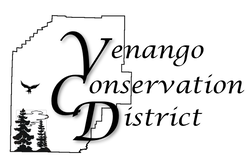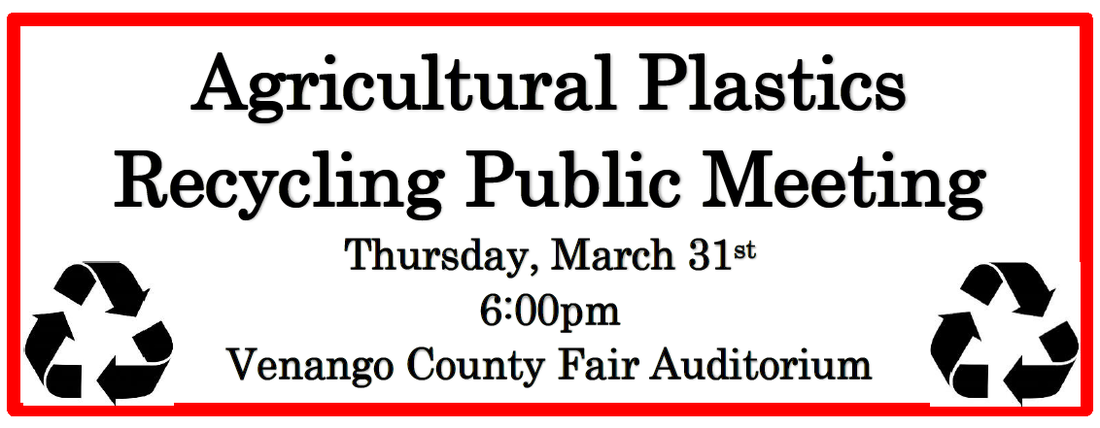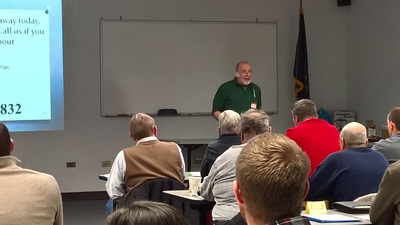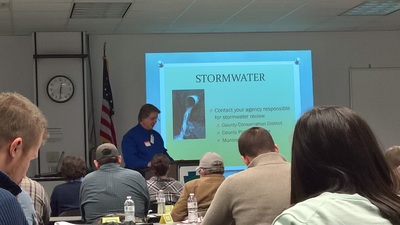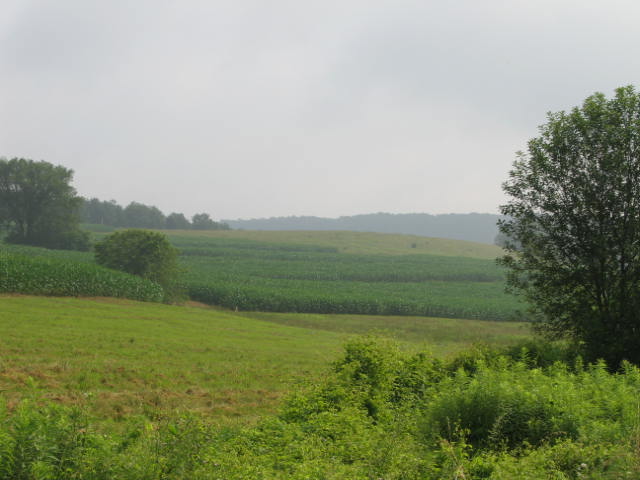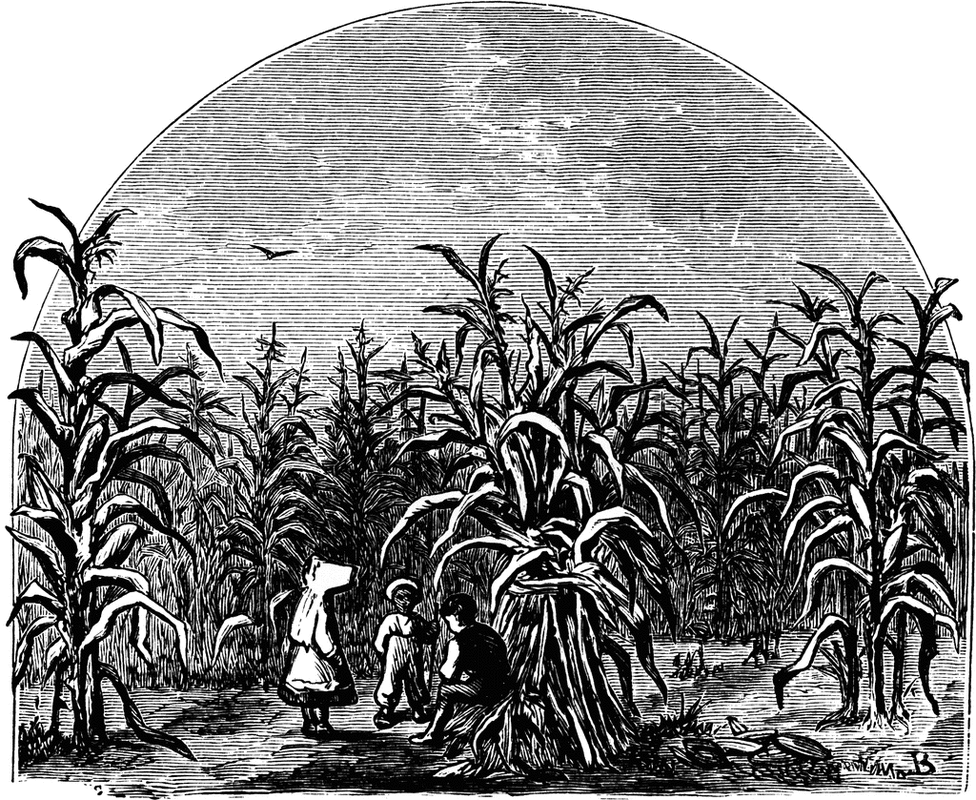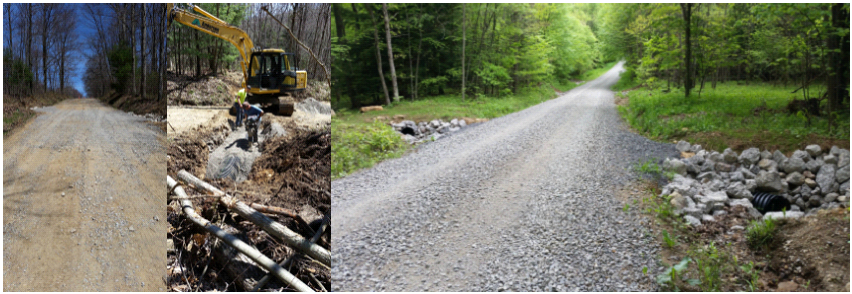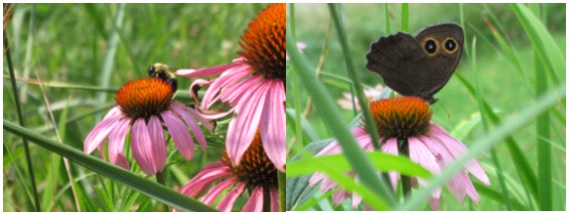|
The Venango Conservation District has teamed up with the Crawford County Conservation District, the Erie County Conservation District and the Mercer County Conservation District to host a Manure Management Field Day event.
Every farm in Pennsylvania that applies manure or agricultural process wastewater is required to have and implement a written Manure Management Plan. You can join us at our field day to learn the facts about manure management and tips that will help you successfully complete a manure management plan for your own operation. Topics we'll cover at the field day include Manure Management Regulations and the Manual, Biosecurity Practices, Farm Vehicle Transportation Regulations, Manure Spreader Calibration Demonstrations, Ag E&S Regulations, PA One Stop Mapping Introduction and more. So, join us on Friday April 8 2016 at the Apple Shamrock Dairy Farm in Townville PA from 9am to 3pm. We're asking that you register for the event, but there is no fee and lunch is provided. Please register by April 1st with Shawn at the Mercer County Conservation District 1-724-662-2242. click here for informational event flier P.S. Can't make it to the Regional Field Day? The Venango Conservation District will be hosting three Manure Management Workshops at the Nature Lodge on Two Mile Run County Park. The dates are: Follow-Up Workshop - April 13th - 9am to 12pm Full Day Workshop - April 14th - 9am to 3pm Equine Workshop - April 26th - 5:30pm to 8:30pm click here for informational event flier
1 Comment
The Venango Conservation District, together with the Venango County Regional Planning Commission and the Venango County Penn State Extension will host a public meeting to discuss potential recycling options for agricultural plastics as alternatives to hazardous burning or costly disposal to landfills.
A wide variety of products are "agricultural plastics". They could include such things as white bale wrap, silage bags, bunker and bale covers, row plastics, high tunnels, hoop plastics, plastic twine, netting and seed/grain bags. These products are increasing in use due to their durability, flexibility and low cost. Some experts estimate that 15-20 pounds of agricultural plastics per year are used per dairy cow. So, the problem becomes, how to dispose of all that plastic. Burning agricultural plastics can release toxic chemicals into the air and residues can contaminate soil and ground water. Options for recycling agricultural plastics are slowly emerging around the country. The challenge is cleaning, collecting and shipping to recycling facilities. Agricultural plastics have the potential to be recycled into garbage bags or plastic lumber. We would like to hear from farmers and producers on their interests and needs with regards to disposal of agricultural plastics. The public meeting will be held on Thursday March 31st 2016 at 6:00pm at the Venango County Fair Auditorium. Please join us! click here for event flier The Venango Conservation District and cooperating agencies held another Integrated Water Resource Municipal Permitting Workshop. That’s a mouthful, but the goal of the workshop was to educate the regulated community and municipalities about all the necessary permitting that needs to be in place before a building permit should be issued. Land owners, contractors, consultants and municipalities all ask us to provide better information on what they should have in place before a building permit is issued. We have worked together with the Venango County Regional Planning Commission, the Pennsylvania Department of Transportation, the Sewage Enforcement Officer and the Pennsylvania Department of Environmental Protection to provide several municipal permitting workshops in an effort to meet that need.
This most recent workshop took place on Friday February 12th at the PennDOT building in Oil City PA. Twenty-six participants were in attendance. They heard presentations on the following: Subdivision and Land Development – Jason Ruggiero, VCRPC Highway Occupancy Permits – PennDOT Sewage Planning – Nick Melnick, Sewage Enforcement Officer Erosion & Sediment Control and NPDES Permitting – Mike Swatzler, VCD Stormwater Act 167 – Lance Bowes, VCD Waterways Obstruction/Encroachment Permitting – Mike Swatzler, VCD Act 166 Floodplain – Phil Gryskewicz, VCRPC Building Code Enforcement – Becky Hosack, Girard Township The feedback to our workshop was very positive, with participants requesting more events in the future. We thank the Northwest Commission for providing funding to the district to provide these educational workshops. We look forward to providing more workshops in the near future. 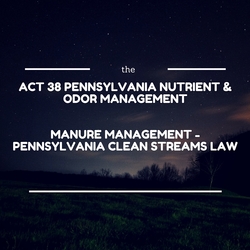 Nutrient Management – Manure Management – what is this stuff all about? Well, since the Venango Conservation District spends a lot of time on nonpoint source pollution solutions, then it’s a good bet that the management of nutrients and specifically manure would be a good place to address these solutions. Excess nutrients can enter local waterways via stormwater and can cause water quality impairment. Nutrient Management Plans can help agricultural operations to utilize nutrients on their farm, while utilizing practices to reduce any pollution that might be running off their farm via stormwater. Concentrated Animal Operations are required by law to develop and implement nutrient management plans. Five to ten percent of farms in Pennsylvania are estimated to fall into the Concentrated Animal Operation category. The other 90% of agricultural operations are encouraged to develop and implement nutrient management plans on a voluntary basis. Pennsylvania requires anyone who land applies manure or agricultural process wastewater to develop and implement a Manure Management plan. Even if a farm does not apply manure mechanically, but might have pastures or Animal Concentration Areas, they still need a manure management plan. The Venango Conservation District can help operators with their Nutrient Management Plans and their Manure Management plans. The VCD works to seek out funding to help operators install and implement best management practices to assist in implementing plans. The district holds workshops to educate operators on plans and how to get one. Contact the Venango Conservation District at 814-676-2832 to get more information. What we at the Venango Conservation District call the “Polk Farm” is land owned by the Commonwealth of Pennsylvania that was once working farmland. Students of what was originally known as the State Institution for Feeble-minded of Western Pennsylvania established in 1893 worked to learn manual dexterity. Students cleared stones and brush, grew crops and cared for livestock.
Eventually the school discontinued farming the property. The Venango Conservation District entered into a Memorandum of Understanding with the Commonwealth to manage 450 acres of school land. Thanks to our cooperator, Sandy Valley Farms, this property has been transformed back into a working farm. Modern farming practices such as no-till planting, contour strips and vegetative buffers are utilized. A great benefit of the farm is the opportunity to showcase these practices as an educational tool. The VCD sponsors a field day event on a regular basis where the public is invited to learn more about land management and conservation practices. We’ll be holding a Field Day event on Thursday September 17th 2015. The Venango Conservation District, in conjunction with the Mercer County Conservation District will be sponsoring an Agricultural Field Day. We’ll have presentations on many agricultural practices as well as information from many sponsors of the event and even pesticide credits. Here is a closer look at the presentations that we’ll be offering:
COVER COP BENEFITS – Joel Hunter, Agronomist for the Penn State Cooperative Extension will be talking about the benefits of cover crops. Cover cropping is one of the most rapidly growing soil and water conservation strategies. It is an accepted environmental practice and in fact, NRCS has set a goal to increase the acres planted nationally in cover crops from 2 million to 20 million by 2020. The benefits of cover crops are increased carbon and nitrogen in soils, erosion prevention, increased beneficial soil fungus colonization and weed suppression. RAINFALL SIMULATOR – Tim Elder, Grazing Specialist for the USDA-NRCS will provide a demonstration consisting of five soil samples such as traditionally tilled soil and no-till soil and soil collected from a forest. He will simulate a heavy rain event and explain how tillage affects soil erosion and water absorption. INFORMATIONAL SESSIONS – just before lunch we’ll hear about USDA-NRCS programs and their benefits to producers. We’ll hear about the Pennsylvania Nutrient Management and Manure Management programs and we’ll learn about the Resource Enhancement and Protection Program (REAP). VISIT WITH THE SPONSORS – this year, there are many sponsors to our event. During lunch, participants will have an opportunity to visit displays from sponsors and cooperators to gather information on how each one can benefit farming operations. STREAM BANK STABILIZATION SITE VISIT – Lance Bowes, District Manager of the Venango Conservation District will lead a field visit to a nearby stream bank stabilization site. He will explain how work at this site has reduced nonpoint source pollution to the stream and saved the agricultural field from washing away during storm events. MANAGING CORN FOLIAR DISEASES – Kevin Fry, Field Agronomist of DuPont Pioneer will give a presentation on managing diseases with DuPont’s foliar health program OPTIONAL PRESENTATION – after the conclusion of the day, we welcome you to stay a bit later to participate in a presentation on Agricultural Management Solutions (AMS) Ike Vorisek of Elder’s Ag & Turf will give a presentation on this latest GPS technology for agriculture. The Venango Conservation District, in conjunction with the Mercer County Conservation District will be coordinating and Agricultural Field Day on Thursday September 17th from 10am to 3pm. The event will be hosted by the Mike Ohler family of Sandy Valley Farms located at 632 Valley Road, Polk PA 16342. This Agricultural Field Day event will provide an opportunity for local farmers to attend an event at a localized level to learn more about the importance and benefits of agricultural practices that help conserve farm land, and ultimately prevent and/or limit nonpoint source pollution.
AGENDA 9:30-10:00 Registration/Visit with Sponsors 10:00-10:15 Welcome 10:15-10:45 Cover Crop Benefits Joel Hunter; Agronomist-Penn State Ext. 10:45-11:15 Rainfall Simulator/Soil Health Tim Elder; Grazing Specialist-NRCS 11:15-12:00 Informational Sessions · NRCS Programs (10 min) NRCS Staff · Nutrient & Manure Management (15 min) Laurel Rush; Western PA NM Coordinator · Resource Enhancement & Protection (REAP)/Farmer Testimony (20 min) Joel Semke; REAP Coordinator 12:00-1:00 Lunch/Visit with Sponsors 1:00-1:45 Steam Bank Stabilization Lance Bowes; District Manager-Venango Conservation District 1:45-2:00 Travel to Field Site 2:00-2:30 Managing Corn Foliar Diseases Kevin Fry; Field Agronomist-DuPont Pioneer 2:30-3:00 Return to Farm/Evaluations OPTIONAL PRESENTATION 3:00-4:00 Agricultural Management Solutions (AMS) - The Latest In GPS Technology Ike Vorisek; Elders Ag & Turf Contact the Venango Conservation District at 814-676-2832 for more information or to register by September 10th. click here for informational brochure The Venango Dirt and Gravel Roads program, administered by the Venango Conservation District, provides education and funding to municipalities to improve dirt and gravel roads in the county. Trout Unlimited found that sediment from dirt roads can be a major contributor of pollution to streams in Pennsylvania. As a result the Commonwealth allocates millions of dollars statewide annually to conservation districts for its Dirt and Gravel Roads program.
Thanks to Ashley Hazlett, the Venango Conservation District Dirt Gravel and Low Volume Roads Technician, this blog entry will showcase a Dirt and Gravel Roads program project in Victory Township. The Dennison Run Road project spans across 400 feet of a hilly dirt road. The section in question was consistently having drainage issues and was losing road surface during storm events. The funding requested for this project was $13.500.00. This funding helped provide for the addition of three new cross pipes. Ditches and banks were also stabilized and road fill was added to maintain a proper crown and a safe driving surface. The estimated value of the project is $18,913.00. Victory Township anticipates submitting an application for further Dirt & Gravel Roads program funding to continue drainage and road surface improvements to the upper hill area of the road. The Venango Conservation District will be conducting a series of classes and activities for children and their families at Two Mile Run County Park. Classes are free, but class registration is required. Children must be accompanied by an adult. The classes are a series of nature walks where participants will learn about bugs, water pollution, habitat, plants and other environmental topics. The classes will be held on three consecutive weekends in August.
Saturday August 15th, 10:00am at Pioneer Flats – a class on Streams. Participants will learn about how streams are formed and different types of pollution that can impair streams. The class will also cover aquatic life and how they can indicate how clean or polluted a stream might be. Participants should wear boots or old shoes. Saturday August 22nd, 10:00am at the Handicapped Fishing Pier – A program on lakes and wetlands. Participants will learn about why the lake is so shallow compared to 20 years ago. The class will also discuss what can be done to solve the problem. Participants should wear boots or old shoes. Saturday August 29th, 10:00am at the Nature Lodge – a class on forests. Participants will enjoy a nature walk on a trail near the lake. The program will cover topics ranging from trees, forest succession and critters of the forest. Participants should bring bug spray. Classes will be about an hour and one half long. This program is a great opportunity to get the family outdoors and have fun. You can register by calling Devin Lineman at 814-676-2832. The purple cone flower, like the ones pictured, are native to eastern and central North America. There are an herbaceous flowering plant of the genus Echinacea. They bloom from mid-summer through early fall.
There are nine species of Echinacea. Some species have been used for medicinal purposes. Native Americans use the roots as a traditional healing herb. Today the roots are used for herbal medicines. Two species are considered by the US Fish and Wildlife as endangered. They are E. Tennesseensis and E. Laevigata. The name “cone flower” is rooted from the Greek echinos which means “sea urchin”. Some Native Americans call them “elk root” because they observed that elk would seek out and eat the roots when hurt or unwell. We call them “cone flowers” because their petals are reflexed. At the Venango Conservation District offices, we planted purple cone flowers because they are a native plant. Our purpose was to provide wildlife food for our garden visitors. Butterflies and bees consume the nectar of our cone flowers, and in the winter, goldfinches eat up the seeds. Cone flowers also have network of root fibers so they can bind soil which protects against erosion. |
CATEGORIESs
All
Archives
April 2024
|
